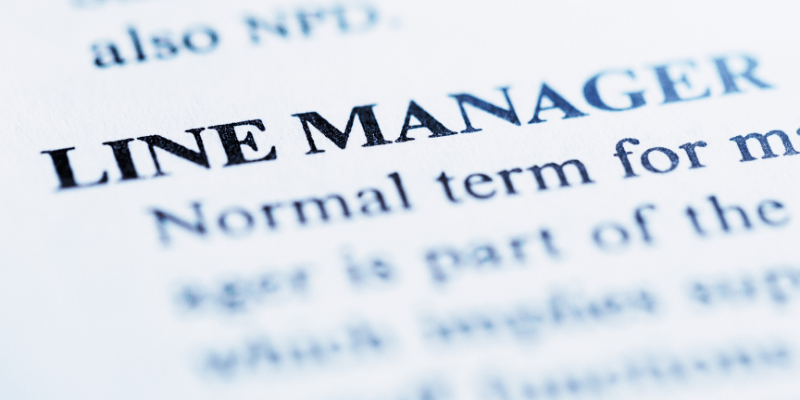news and blogs
news and blogs
Discover the latest news, updates and blogs from (my) hr director here.
DISCLAIMER:
The materials in this guidance are provided for general information purposes and do not constitute legal or other professional advice. While the information is considered to be true and correct at the date of publication, changes in circumstances may impact the accuracy and validity of the information. (my) hr director is not responsible for any errors or omissions, or for any action or decision taken as a result of using the guidance. You should consult a professional adviser for legal or other advice where appropriate.

By Mark Pearce
•
07 Jul, 2022
Line managers have the biggest influence upon work morale and employees experience’s within the work place. Improving the wellbeing of their own and of their employees aids to benefitting the whole organisation and higher achievements for the company. This is what makes a line manager’s role so important. Here are some key factors to consider if wanting to be an effective line manager for your organisation: Positive approach. It is a line manager’s duty to take positive approaches within situations and being appreciative of their team rather than handing out blame. It is important to be able to take on board a myriad of perspectives and consult within the team. It’s important for line managers to remain calm and composed under pressure despite deadlines or any personal matters. Remaining respectful, fair, impartial, and kind will gain respect from your team. Integrity and consistency are also key behaviours of a line manager and are often reflected within your employees too. These positive approaches enhance your employee’s level of engagement and wellbeing within their job roles. Conflict management. Line managers must resolve employee conflicts effectively and in an impartial way, following your own company’s procedure in addressing the problem. It is essential that you provide appropriate support for yourself and your employees; using the company’s resources to do so. It is also your responsibility to make sure any severe issues are addressed and those involved are well supported throughout. The clarity, guidance and advice you can provide your team will also benefit their mental health. Your team will have a positive outlook on their job role and engage in a positive way within their performance based on how it is communicated to them. Defining roles. Demonstrate a clear understanding of your own role, and of your team member’s roles. This will provide your team with a better understanding of your expectations of them and allow you to provide useful advice and guidance on their contribution to the team. A line manager needs to allow time for their employees (one-to-one time when permitted); taking the responsibility for problem solving and following up leads, all whilst being decisive. Supporting employees in this way will ensure they are fully engaged, motivated and clear of their job role will likely lead to succeed and progress. Rapport. Building and sustaining relationships with your team is hugely important when acting as a line manager for an organisation. It is important that you show your employees that you are interested in them as a person and engage with them in a friendly, empathetic manner. These traits create a supportive, positive culture. This allows your employees to feel ‘psychologically safe,’ thus improving benefits of engagement, learning and better performance. Such a working culture will reduce employee’s fear and anxiety related to expressing their views and thoughts. Encouragement. A line manager needs to take time to speak one-to-one with employees; particularly within career development and making sure you are available to actively support this too. You will need to arrange and offer career opportunities and development. This allows your team to align their personal needs of physical or psychological fulfilment with the advanced career opportunities; leading to a higher performing workforce. It is important that you recognise the members of the team who need to be encouraged to progress further, and support all team members to take part in professional development opportunities. Contact us for more information. More information and sources: The CIPD (Chartered Institute of Personnel and Development) is an independent organisation who aims is to improve working life for all within employment. CIPD has created quick and easy guidance especially for line managers to ensure they can fulfil their management capacity.

By Mark Pearce
•
07 Jul, 2022
The 'always on' work culture. Within the wrong hands, the same technology that makes remote work possible can also make work inescapable. We live in a world of hyper connectivity, thanks to smartphones, laptops and tablets, there’s implicit expectation that we should always be online and available; even outside of our normal working hours, thus having an ‘always on’ work culture. The ‘always on’ work culture is dangerous when considering the pandemic. There are many employees working longer hours, possibly remotely isolated at home, and many taking fewer absences to make up for lost time at work. With heightened stress levels nationwide, emotions are high, with more stress and pressure on employees due to many having the risk of redundancy or being furloughed. This will lead to employees feeling less fulfilled by work and life which can have a damaging effect on their mental health and wellbeing as well as work performance. The impact of COVID19 on working environments. The coronavirus pandemic has undoubtedly changed and adapted the way we work. There have been a myriad of challenges and changes from sickness, loss, furlough and redundancy. There’s a significant amount of improvement required within employees health and wellbeing, especially within the role of a line managers support. Due to the pandemic three-fifths of organisations are tackling leaveism and presenteeism; albeit a new form from traditional office definitions. This has become even more noticeable since the pandemic began. The merging of work and home lives has had the negative effect of the ‘always on’ environment, but also seen an increase in the levels of anxiety regarding returning back to the workplace after lockdowns and periods of absence. The resolution? This has led to the pandemic adding pressure onto senior leaders to take mental health more seriously; with most organisations having put in extra measures to tackle such issues. Mental health of employees can still be affected by their financial status and worries around financial security and so it is important that organisations aim to provide more support for employees’ financial wellbeing as well as their work-life balance. The pandemic may have exacerbated the ‘always on’ issue. For many, there are no buffers to protect them around the working day patterns; with commutes, school runs and routines lost in the midst of the pandemic. Even with many workplaces now reopened, employees are under constant threat of having to shield should anyone in their “bubbles” come into contact with someone who has tested positive for COVID. The lack of knowledge and training provided to line managers to support employees with ill mental health needs to be addressed. This is needed especially considering the negative impact of the pandemic on peoples stress and mental health, alongside the health risk of those with increased homeworking. The pressure to always be on can also lead to burn-out. This is a psychological, emotional and physical state people can find themselves in when they’ve been dealing with poorly managed stress for a long time. Increased homeworking, stress and ill mental health due to the pandemic and having an ‘always on’ work ethic can have a detrimental effect on individuals, and on their organisation’s performance. Line managers without effective, informative training about disabilities and long-term health problems fail to support those individuals within the team. Unfortunately, less than a third of organisations provide line mangers with this vital training. Organisations are failing to publish workforce disability information which affects the organisation in retaining staff and hinders the ability to manage these individuals; thus showing a lack of supporting framework within the recruitment process of the company. Absence in organisations has been detrimentally impacted due to the Covid19 pandemic with it being reported that one in ten absences are now due to COVID19. This leads to companies using methods to improve employee’s attendance; such as attendance reviews, leave, return-to-work interviews and health checks. If you need to discuss your mental health workplace policies and/or how the pandemic has impacted on your business, please contact our HR experts here. Original source of information: https://www.cipd.co.uk/knowledge/culture/well-being/health-well-being-work

By Mark Pearce
•
25 Apr, 2021
The Chartered Institute of Personnel and Development (CIPD) provide a range of online resources to help line managers in their role within an organisation. CIPD is a professional association for human resource management professionals, and a great resource for line managers, and other HR professionals. What do the online resources include? - Introductions Providing guidance and exercises to help line managers support the health, wellbeing and engagement of their team - Tools and quizzes Help to determine how your management approach aligns with your teams and find the best ways to ensure proactive and positive management styles using a range of quizzes, exercises and online tool kits. - Line management development exercises A range of exercises provided in mind of developing your management approach - Factsheets Providing information on the role of line management and its relationship to an organisation’s people practices - Guides Providing guidance on a range of topics from supporting remote workers, legislation, differing types of leave and more. Where can I access such support? All online resources are available via the CIPD website. Resources specific to supporting Line managers can be found at: https://www.cipd.co.uk/knowledge/fundamentals/people/line-manager

By Mark Pearce
•
18 Apr, 2021
From 1st January 2021 the UK officially departed from the European Union; having an impact on employers whose staff are EU nationals. How does this impact on EU citizens employed in the UK? EU citizens who were recruited before the 31st December 2020, and who have not been granted indefinite leave to remain (ILR), need to gain permission to remain working in the UK. They can gain this permission via applying to the EU Settlement Scheme. What is the EU Settlement Scheme? The EU Settlement Scheme assesses applications from EU citizens against set criteria on why they are currently working in the UK. Applications for the Scheme can be made for free from the gov.uk website. Workers must apply by the 30 June 2021 , and those who have lived and worked in the UK for at least 5 continuous years are granted the EU Settlement Scheme are guaranteed the right to continue living and working in the UK indefinitely. Those who have less than 5 years continuous years in the UK prior to the 31st December 2020 will be granted 5 years to continue working in the UK, by the end of which they can reapply and be granted indefinite settled status. Illegal working As always, employers have a legal obligation to prevent illegal working and can be subjected to penalties, such as fines up to £20,000 per worker, and criminal convictions where they fail to do so. Where can I find out more information For more information contact mark@my-hrdirector.co.uk

By Mark Pearce
•
11 Apr, 2021
The Government have announced that they plans to increase family leave pay and sick pay from April 2021. Family leave pay Family leave pay is currently £151.20 per week and is claimed for by those on maternity, paternity, parental and bereavement leave. With the Government’s proposed changes, England will see an increase of 77p per week added to the statutory weekly amount; bringing the new family leave pay amount to £151.97 per week. Statutory sick pay Statutory sick pay is accessible to all employees paying Class 1 National Insurance contributions, irrespective of age, who earn of at least £120 per week from 6 April 2020. Eligibility for statutory sick pay (SSP) is currently £95.85 per week. With the Government’s proposed changes, England will see an increase of 50p per week added to the statutory weekly amount; bringing the new statutory sick pay amount to £96.35 per week.

By Mark Pearce
•
04 Apr, 2021
With the world starting to return to normal as periods of lockdown are due to end over the next few months, the spotlight is now on mums and the impact of returning to work in the midst of a pandemic on mothers and pregnant women. What are the employers’ responsibilities towards pregnant women? All employers have a duty to conduct risk assessments for any workplace risks and this includes any additional risks towards pregnant women. With COVID19 now here, employers have a responsibility to include a specific COVID19 risk assessment. This should be done for all employees, not just pregnant women. What should a risk assessment discuss for pregnant women? Before the pandemic, a risk assessment should be carried out for all pregnant employees, detailing the risks of their job and whether or not they pose a higher or sustained risk when pregnant. The risks will differ during different stages of pregnancy and this should be accounted for in the risk assessment. This should be done as soon as possible after being notified that the employee is pregnant. Maternity Action advise that employers must also assess the ‘risk of infection from Covid-19 and take into account the fact that pregnant women are classed as vulnerable under the Health Protection (Coronavirus, Restrictions) Regulations 2020 and that RCOG guidance says that pregnant women are at higher risk from 28 weeks of pregnancy’. Risk assessments should be regularly reviewed for all employees, and especially for pregnant women as pregnancy changes constantly. Medical updates from GPs and/or midwives should also be considered when reviewing such risk assessments. You can find out more about what Maternity Action have to say on the matter here. What should an employer do if one of their team becomes pregnant? An immediate risk assessment should be conducted and actions taken to limit/ remove risks wherever possible. For more information on what to do in regards to COVID19 Risk Assessment for pregnant women, or if you need advice on maternity, paternity or related procedures, contact our dedicated team at (my) hr director.
Join Our Mailing List for HR updates
Thank you for subscribing to (my) hr director's mailing list and newsletter.
You can unsubscribe at any time by contacting us or via the instructions at the bottom of any mailings.
Oops, there was an error sending your message.
Please try again later.
Please try again later.





